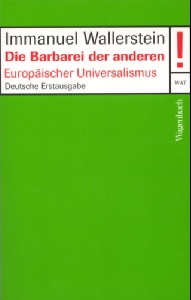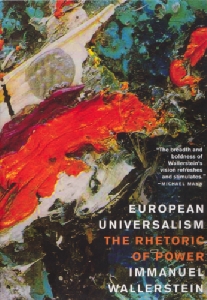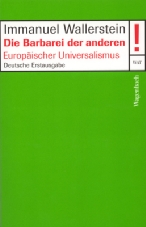European Universalism - The Rhetoric of Power
"To Anouar Abdel-Malek, who has spent his life trying to foster a more universal universalism"
Immanuel Maurice Wallerstein
Can One Be a Non-Orientalist ? - Essentialist Particularism
"By the eighteenth century, the issues that Sepúlveda and Las Casas had debated were no longer a matter of fierce debate. The European world had settled down into a general acceptance of the legitimacy of its colonial rule in the Americas and other parts of the world. Insofar as public debate about colonial regions continued at all, it had become primarily a debate about the rights to autonomy of the European settlers in these regions, rather than one about how Europeans should relate to the indigenous populations. Nevertheless, the Europeans in their expansions, travels, and trade were now coming more and more into contact with populations - particularly in Asia - who were located in what in the nineteenth century came to be called zones of "high civilizations" - a concept that included, among others, China, India, Persia, and the Ottoman Empire (...)"
Wallerstein, Immanuel Maurice: European Universalism. The Rhetorik of Power. New York: The New Press 2006
Western intervention ...
But, as world-renowned social scientist Immanuel Wallerstein argues in this short and elegant philippic, these concepts are not, in fact, global. Rather, their genesis is firmly rooted in European thought, and their primary function has been to provide justification for powerful states to impose their will against the weak under a smoke screen of what is held to be both beneficial to humankind and historically inevitable. At a time when such intervention - in the name of democracy and human rights - has returned to the center of world politics, Wallerstein's treatise is both essential and convincing.
Immanuel Wallerstein,
"Orientalism in Crisis"
"After 1945, the geopolitics of the worl-system had changed considerably. The war against the Nazism had drwan such terrible conclusions. And even more important, the non-European world about which the Orientalists had been writing was in full political rebellion against Western control of their countries. Anticolonial revolutions were occuring throughout Asia and Africa, and there were internal politico-cultural transformations occuring in Latin America (...)"
(ibid., p. 34)
"In 1963, Anouar Abdel-Malek published
an article that chronicled the impact of these political changes on the world of scholarship. It was titled "Orientalism in Crisis". He analyzed the two main historic premises of the Orientalists. At the level of the problematic, he argued, Orientalists had constituted an abstract entity, the Orient, as an object of study. And at the thematic level, they had adopted an essentialist conception of this object. Abdel-Malek's attack on both these premises was considered at the time intellectually (and politically) radical, although it seems almost commonplace to us now:
Thus we arrive at a typology based on a real specificity but detached from history, and thus conceived as intangible and essential. It converts the "object" studied into an other, in relation to whom the studying subject is transcendent; we shall have h o m o S i n i c u s, h o m o A f r i c a n u s, h o m o A r a b i c u s (and why not h o m o A e g y p t i c u s?), while man - "normal" man - is the European man of the historical period dating from Greek Antiquity. We can thus see clearly how, between the eighteenth and twentieth centuries, the hegemonism of the possessing minorities exposed by Marx and Engels, and the anthropocentrism dismantled by Freud, go hand in hand with Euro-centrism in the human and social sciences, particularly those which have a direct relation to the non-European peoples. (1972) 1981, 77-78).
Abdel-Malek was not widely read in the pan-European world outside a small group of specialists, however. It is the book published fifteen years later by Edward W. Said, Orientalism (1978) 2003), that stimulated a wide cultural debate about Orientalism as a mode of knowledge and interpretation of the reality of the non-Western zones of the modern world (...)"
(ibid., p. 34-35)
"Saids book
was a study of the academic field of Orientalism, especially that part of it that dealt with the Arab-Islamic world. But it was also, and more important, a study of what Said called the "more general meaning" of Orientalism, "a style of thought based on an ontological and epistemological distinction made between "the Orient" and (most of the time) "the Occident" (1978) 2003, 2). He saw Orientalism as more than a style of thought. It was also, he asserted, "a corporate institution for dealing with the Orient, ... (an) enormously systematic discipline by which European culture was able to manage - and even produce - the Orient politically, sociologically, militarily, ideologically, scientifically, and imaginatively during the post-Enlightenment period" (3).
And then Said added: "To say simply that Orientalism was a rationalization of colonial rule is to ignore the extent to which colonialism was justified in advance by Orientalism, rather than after the fact" (39). For "Orientalism is fundamentally a political doctrine willed over the Orient because the Orient was weaker than the West" (204).
Furthermore, in his view, Orientalism as a way of thought is self-contained and not open to intellectual challenge:
The Orientalist surveys the Orient from above, with the aim of getting hold of the whole sprwaling panorama before him - culture, religion, mind, history, society. To do this he must see every detail though the device of a set of reductive caegories (the Semites, The Muslim mind, the Orient, and so forth). Since these categories are primarily schematic and efficient ones, and since it is more or less assumed that no Oriental can know himself the way an Orientalist can, any vision of the Orient ultimately comes to rely for its coherence on the person, institution, or discourse whose property it is. Any comprehensive vision is fundamentally conservative, and we have noted how in the history of ideas about the Near Orient in the West these ideas have maintained themselves regardless of any evidence disputing them. (Indeed, we can argue that these ideas produce evidence that proves their validity.) (239)
In the Afterworld to his book written fifteen years after the original publication, Said contended that the anger and resistance that greeted his book and others making similar arguments was precisely that "they seem to undernmine the naive belief in a certain positivity and unchanging historicity of a culture, a self, national identity" (332)."
(ibid., p. 35-37)
"Lucid, informed, and insightful."
The New York Times
"A prolific, provocative, "big-picture" theorist."
Booklist
"Wallerstein's ideas are compelling ... (They provide) a new explanation, a new classification, indeed a revolutionary one, of received knowledge and current thought."
Fernand Braudel
Literature:
Abdel-Malek, Anouar. "Orientalism in Crisis." In Orientalism: A Reader, edited by A. L. Macfie, 47-56. New York: New York University Press, 2000. (originally published in Diogenes 44 (Winter 1963): 104-112).







